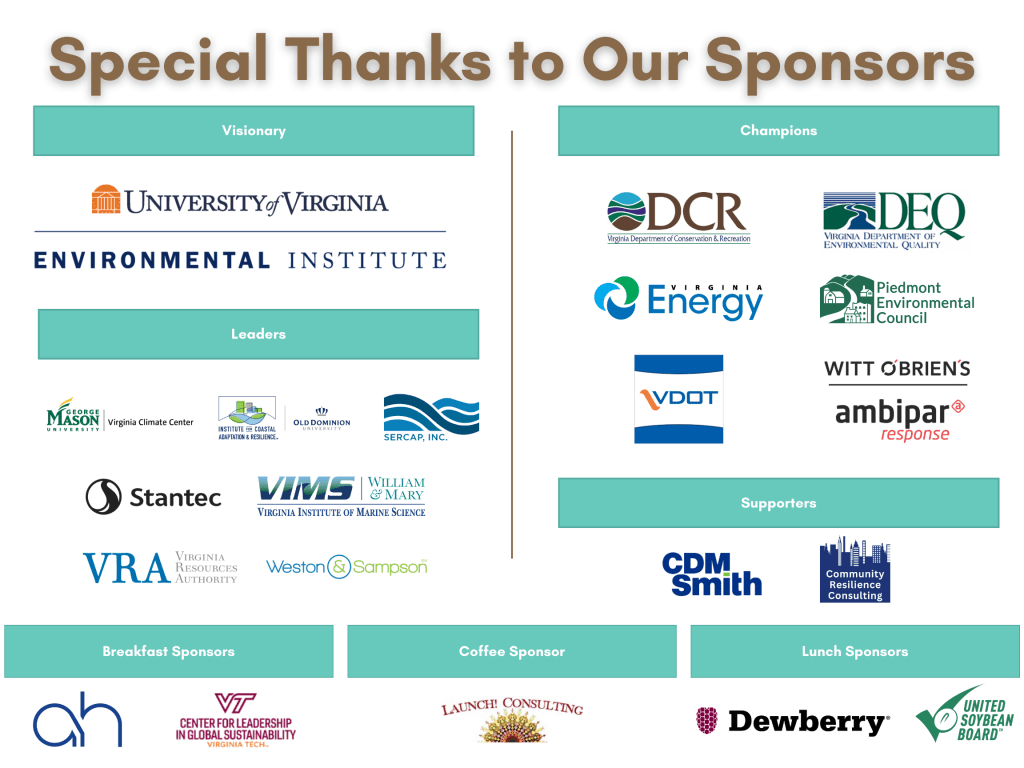A Summary of the 2023 Resilient Virginia Conference
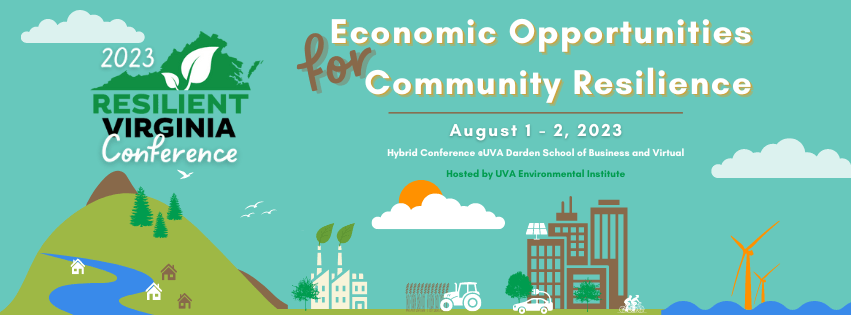
The climate is changing and that means different things to different people. On the coast, there is the worry of sea levels rising that will have significant consequences on these communities, including a declining economy, loss of land, saltwater intrusion of freshwater supplies, increasing cost of home insurance, and migrating populations, to name a few.
Inland, the focus is different. These communities are concerned about things such as how the changing temperatures and weather patterns will affect their crops; what will happen to their jobs (and subsequently, their local economy) when the state transitions away from fossil fuels to renewable energy; and whether or not their infrastructure is good enough for the hotter days and increase in heavier rainfalls. Community resilience will look different for all of these communities but the one thing they have in common is that they will all require some sort of planning and funding.
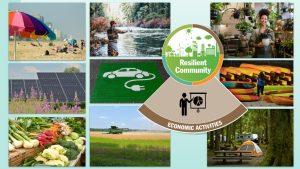
We chose to focus this year’s Resilient Virginia Conference on the numerous economic opportunities that currently exist for building community resilience in the state. Let’s be clear – businesses and communities will increasingly face risks in infrastructure damage, supply chain disruptions, and the toll on workers. However, by taking advantage of economic opportunities, they can begin to address the risks they are facing.
Some of these opportunities are new, like the tremendous amount of funding coming from the federal government as a result of the Infrastructure Investment and Jobs Act and the Inflation Reduction Act. Besides the unprecedented federal funding to support infrastructure and climate actions by states and localities, there is a parallel opportunity that is growing every year to expand climate-related business and workforce initiatives. For example, the latest figures from E2 shows that clean energy jobs in Virginia grew nearly 4.5% in 2021. This was more than 3.5 times faster than overall employment.
Some of these opportunities are not so new, such as the organizations and programs that have already been helping Virginia’s communities build resilience – for example, the Southeast Rural Community Assistance Project (SERCAP) and Virginia DCR’s work on Flood Resilience Planning.
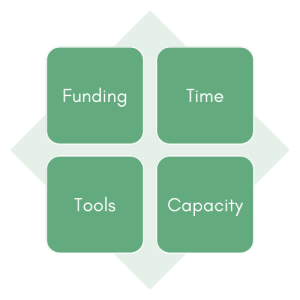 Although funding is crucial, it isn’t the only resource communities need to prepare for anticipated hazards, adapt to changing conditions, and withstand and recover rapidly from disruptions. Building resilience can be complicated and time-consuming. Communities need to know what data they require and where they can find it; what tools are available to help them throughout their journey and how to use the tools; ways in which they can become more resilient with limited capacity; and how they can achieve community buy-in.
Although funding is crucial, it isn’t the only resource communities need to prepare for anticipated hazards, adapt to changing conditions, and withstand and recover rapidly from disruptions. Building resilience can be complicated and time-consuming. Communities need to know what data they require and where they can find it; what tools are available to help them throughout their journey and how to use the tools; ways in which they can become more resilient with limited capacity; and how they can achieve community buy-in.
Through plenary sessions, breakout sessions, and workshops, the whole range of resources was highlighted at the conference – with a focus on how they can work together to address climate impact.
Conference Highlights
Economic Risks and Opportunities
Economic risks and opportunities was the main focus of the conference (and presented by Delaney Luna, (IEDC), who spoke about their report Economic Development in a Changing Climate: Minimizing Risks and Maximizing Opportunities). This theme was interwoven throughout the plenary sessions, breakout sessions, and workshops, underscoring the U.S. Chamber of Commerce’s position that “Inaction (on climate) is not an option”.
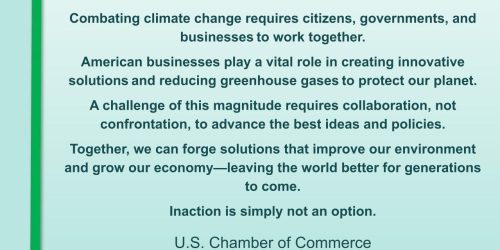
Federal Funding for Infrastructure
State agencies, nonprofit organizations, and consulting firms highlighted how communities can use funds from the Inflation Reduction Act (IRA) and Infrastructure Investment and Jobs Act (IIJA) (amongst others) for infrastructure projects. The types of projects this funding supports is vast but some examples include, alternative fuel projects; protecting and improving evacuation routes; improvements to energy efficiency in rural areas; home energy rebates; state-based energy efficiency contractor training; brownfields projects; bridge investments; and clean water.
Ecosystem Services, Economic Activities, Community Action, and Infrastructure and Buildings
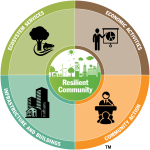 The breakout sessions and workshops were split into four tracks, based on the four components of a resilient community. Attendees could choose which sessions and workshops they wanted to attend and all sessions were recorded so attendees can now watch any discussion they missed.
The breakout sessions and workshops were split into four tracks, based on the four components of a resilient community. Attendees could choose which sessions and workshops they wanted to attend and all sessions were recorded so attendees can now watch any discussion they missed.
Tools for Resiliency Planning
Speakers highlighted numerous tools for resiliency planning, including MARISA’s Climate and Hazard Mitigation Planning (CHaMP) Tool; FEMA’s National Risk Index; U.S. EPA’s Environmental Justice Screening and Mapping Tool (EJScreen); VA DEQ’s Virginia EJScreen+; USGS’s National Water Dashboard; and the Climate Explorer (a collaboration between NOAA, NASA, USGS, US EPA, Bureau of Reclamation, and the U.S. Global Change Research Program); plus many more. These tools can help community leaders, members, and organizations gather the data they need to plan for anticipated hazards and changing conditions; make equitable planning decisions; and prioritize projects.
Virginia University Resources
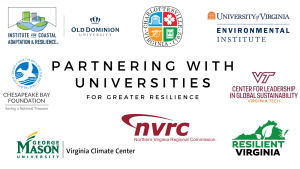 Four universities came together for a discussion on how on-the-ground research can help local communities. The work of these universities (plus so many others across the Commonwealth) can significantly benefit the communities they are working with. This workshop highlighted:
Four universities came together for a discussion on how on-the-ground research can help local communities. The work of these universities (plus so many others across the Commonwealth) can significantly benefit the communities they are working with. This workshop highlighted:
- Virginia Tech’s Center for Leadership in Global Sustainability XMNR program’s partnership with Resilient Virginia in carrying out a needs assessment assignment for the formation of the Resilient Virginia Collaborative Alliance;
- University of Virginia’s Environmental Institute (EI) and the many projects and research carried out by EI students that have benefited the City of Charlottesville;
- George Mason University’s Virginia Climate Center (VCC) and the ways the Northern Virginia Regional Commission is working with the VCC for their planning efforts; and
- The formation of the Resilient and Adaptable Communities Partnership between Old Dominion University’s Institute for Climate Adaptation and Resilience and the Chesapeake Bay Foundation.
Natural Resources Role
Natural resources provide benefits and services that are essential to human survival including food, water, clean air, and building materials. Healthy ecosystems can help protect communities from the impacts of extreme events like flooding, heat, drought, and wildfire; as well as provide recreational and employment opportunities. Speakers at the conference discussed numerous ways that natural resources can provide community resilience and strengthen local economies. Some projects include a community garden in Staunton that serves low-food-access areas; a multi-state USDA-funded project that promotes climate-aware farming practices; retaining forests through carbon credit sales; supporting diversity in farm ownership; a managed retreat program that helps build rural coastal resilience; and urban forest projects aimed to reduce heat islands in underserved communities.
Success Stories/Lessons Learned
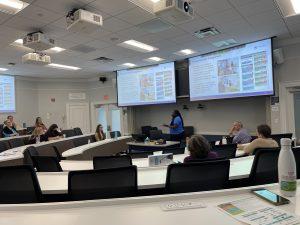 One thing we feel can be extremely helpful to communities and organizations is hearing what other communities and organizations have done to build resilience, so we devoted an entire breakout session to providing these types of case studies. According to our post-conference survey, hearing about these initiatives and programs directly from the people who implemented them and being able to ask questions and seek further information was very impactful for our audience.
One thing we feel can be extremely helpful to communities and organizations is hearing what other communities and organizations have done to build resilience, so we devoted an entire breakout session to providing these types of case studies. According to our post-conference survey, hearing about these initiatives and programs directly from the people who implemented them and being able to ask questions and seek further information was very impactful for our audience.
Final Notes
If you missed the conference, you can watch one of the plenary sessions that is offered on our website. According to conference attendees, Plenary 2 – The Bill is Coming Due: Mitigating the Costs of Disasters was the most informational plenary session at the conference so we have made the recording of this session available to everyone. You can watch the video here.
For Conference attendees, all recordings are available on the conference website. In November, we will add the recordings to the Resilient Virginia Member Site so our members will also be able to watch them at that time. Not a member? Join us today to get access to this benefit (plus more)!
